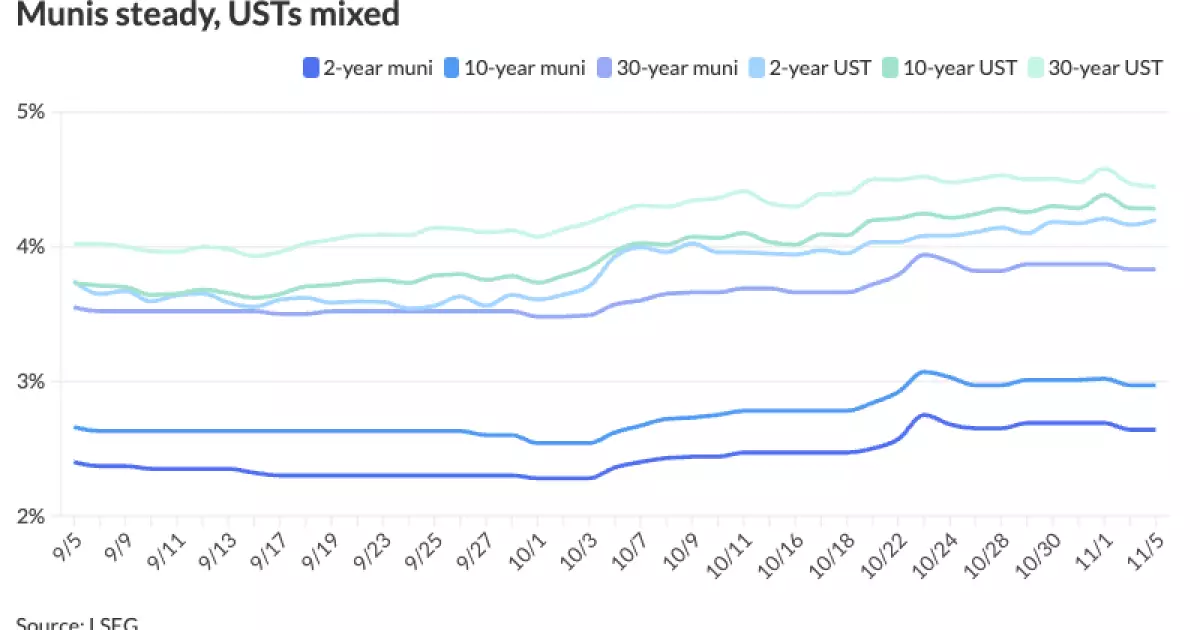Given the current financial climate, it’s crucial to delve into how municipal bonds are currently responding to the political environment and what this suggests for future market movements. As investors prepare for significant events such as elections and Federal Open Market Committee (FOMC) meetings, the uncertainty they generate can notably influence the behavior of various market segments, particularly in fixed income.
Municipal bonds are often viewed as a safe haven, yet recent events illustrate a growing divergence in expectations based on political outcomes. As participants await an impending election and potential adjustments in monetary policy, market activity has slowed. The anticipation around these events has led many participants to adopt a wait-and-see approach, creating a state of equilibrium where values remain stable. However, trading volumes tend to fluctuate as investors react to the outcomes, which can drive market volatility.
In particular, the prospect of a rate cut by the Federal Reserve has been highlighted, suggesting positive momentum in the market. Yet, the elections introduce variables that complicate these expectations. Analysts observe that a triumph by former President Trump could lead to inflationary pressures, whereas a win by current Vice President Harris might preserve existing economic policies. This divergence can heavily affect investor confidence and the overall market climate, making it imperative for bondholders to remain vigilant.
Tax Policies and Their Implications for Municipal Debt
The implications of the election on municipal bonds go beyond mere political sentiment. The structure of taxation proposed by respective candidates plays a pivotal role in shaping the attractiveness of tax-exempt municipal bonds. According to analysts, if the Republican party were to achieve a sweeping victory, initiatives such as tax reductions could strain demand for municipal bonds. This is particularly relevant for bonds that rely on a tax-exempt status, as these typically thrive in an environment of higher taxes.
On the other side, if Harris were to secure the presidency but face a Congress resistant to progressive taxation reform, the effects could still be complex. The bond market would likely experience a subdued demand, especially if corporations and high-income taxpayers were insulated from significant tax hikes. Conversely, a full Democratic sweep could herald an increased interest in municipal bonds, as higher taxes on corporations and affluent individuals could enhance the demand for comparative tax-exempt options.
Fixed-income markets have generally mirrored the actions of the Federal Reserve in recent years. The relationship between the central bank’s monetary policies and bond market performance has never been more pronounced. However, the unique dynamics of an impending Trump administration pose questions about future rate cuts. With Trump’s history of increasing tariffs on international trade, any resultant inflation could anchor the Fed’s capacity to introduce rate reductions, thus affecting bond performance in the process.
Analysts are divided on the potential outcomes of a Trump presidency. Some argue that experiences from past policies would indicate a fruitful environment for fixed income, while others warn that inflation could curtail any bullish momentum in the market. The general sentiment appears to indicate that interest rates’ direction will largely depend on inflation levels, which remain as a critical measure of economic health.
In light of the shifting landscape, active participants in the bond market must pay close attention to the interplay of debt levels, government spending, and monetary policy decisions. The mounting national debt, coupled with fluctuating interest expenses, creates a precarious situation for the Federal Reserve as it attempts to maintain balance—either striving to stimulate economic growth through lower rates or managing inflation pressures by keeping rates elevated. This balancing act inevitably influences investor behavior, potentially shifting preferences from risk assets back to bonds.
As the market continues to process these complex factors, the volatility resulting from both upcoming elections and monetary policy changes will likely dictate investment strategies. Investors may need to reconsider their portfolios, weighing the merits of holding municipal bonds against potential shifts in taxation and interest rates. Assuredly, the time ahead will demand a shrewd understanding of both macroeconomic indicators and the sociopolitical landscape to navigate these challenges effectively.
While municipal bonds have historically been a bastion of stability, the current political atmosphere and anticipated decisions by the Federal Reserve suggest a looming period of transformation. Market participants would do well to remain informed and adaptable to the changes that lie ahead, ensuring they are adequately positioned to benefit from, or mitigate against, incoming volatility.

